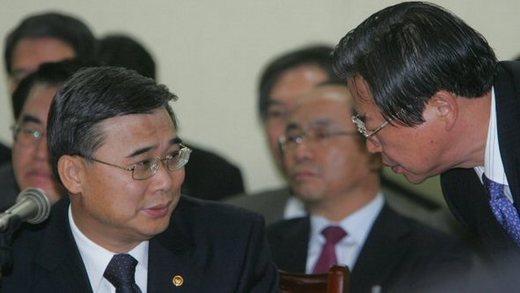 |
|
Unification Minister Lee Jong-seok (left)
|
Gov’t says its Engagement will still remain intact
The resignation of Unification Minister Lee Jong-seok symbolizes the changes underway in the current administration’s offices of foreign affairs and national security. The Blue House says that Lee’s replacement does not mean the end of its engagement policy on North Korea - Lee had been a proponent of the policy, a continuation of the Kim Dae-jung administration’s so-called Sunshine Policy - but the Blue House announced on October 25 that it would realign government teams concerned with the North Korea issue.
The presidential office said that the realignment was being done in order to maintain the administration’s policy North Korea. Regarding this, presidential spokesman Yoon Tae-young said on October 25 that Minister Lee’s replacement would not lead to a change in basic policy, and at a press conference that day, Lee also repeatedly stressed the same thing.
Lee apparently made such remarks to brush off predictions that the policy was about to be overhauled. But some have raised questions about maintaining this policy following the North’s test of a nuclear device on October 9, and majority opinion is that the Roh Moo-hyun administration’s policies on the North have already been scrapped. The seven-article statement issued by the government shortly after the North’s nuclear test contained only a hard-line message against the North and comments about "close consultations with the international community."
In response to public opinion on the matter, the government explained that its basic policies on North Korea have not changed, but rather that they have entered a period of adjustment.
Many experts in the field do not buy the government’s line. They see a collapse in coordination among ministries and government agencies in charge of foreign affairs and national security. This, they say, has forced the government into a period of so-called "realism," with an emphasis placed on international cooperation in the Blue House and the Ministry of Foreign Affairs and Trade. Minister Lee’s tendering his resignation reflects this reality. On condition of anonymity, a North Korea expert described the current state of affairs in the government as "North Korean policy in ruins." The expert said that "regardless of Lee’s resignation, the basic policies on North Korea already have changed." If the government has no firm stance on engagement policy regarding the North, the expert said, the voice of South Korea inevitably will be reduced rapidly in the ROK-U.S. relationship. Under current circumstances, the government is all talk regarding its obligation to fulfill the tenets of the U.N. Security Council resolution against North Korea, according to the expert. He mentioned that the government persuaded the U.S. to accept its engagement policy, by using a meeting between North Korean leader Kim Jong-il and then-unification minister Chung Dong-young on June 17 last year as leverage. The expert questioned, Who will be able to play such a role in the future? In this respect, realigning the government team in charge of foreign affairs and national security is important, but providing practical conditions to maintain the bases of engagement policy on North Korea is no less important. According to some political observers, a person who can send the message that "there will be no change to the engagement policy on North Korea" in and out of the nation will likely be the next unification minister. Given this, Reps. Moon Hee-sang, Bae Ki-sun, and Im Jong-seok of the ruling Uri Party, and former Vice Unification Minister Lee Bong-jo, have been mentioned as possible candidates. But under the current environment and systems, there will not be much that the next unification minister can do, sources say. Lee said that his resignation is aimed at giving a freer hand regarding policy and those in charge of it to the president. These remarks, and his resignation, show the limitations of the position of unification minister.






